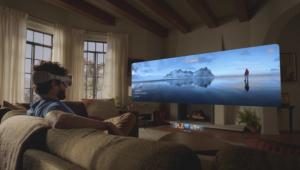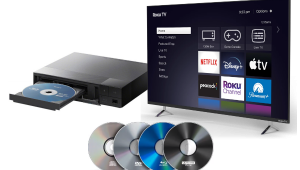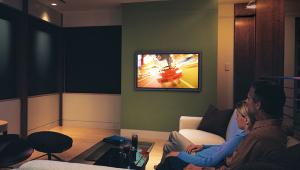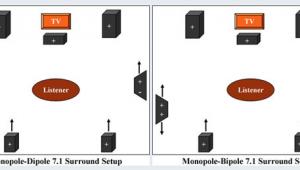I think its obvious by this poll so far which we prefer.
Primary tabs
OLED vs. 4K Ultra HD: Which Technology Do You Prefer?
- Samsung spotlighted 85-, 95- and 110-inch 4K Ultra HDTVs in open tripod-like frames and said the 85-inch model will hit stores in March/April. Also see this report.
- LG showcased the 84-inch 4K Ultra HD TV that went on sale in late 2012 and revealed plans for 55- and 65-inch screen sizes later this year. OLED was also front and center in the form of a 55-inch set the company plans to deliver in March for $12,000; LG also demonstrated a curved OLED panel that’s said to deliver a more accurate image. Also see this report.
- Panasonic and Sony teamed up to produce OLED panels using a new printing technology. Both companies showed the only 4K OLED panels at the show.
- Sony announced plans to expand its 4K Ultra HD line this spring with 55- and 65-inch screen sizes that will join the 84-inch model announced last year and showed a 4K Ultra HD video player.
- Value-leader Vizio highlighted a 70-inch 4K Ultra HDTV that will be joined by 55- and 65-inch sets later in the year.
- Toshiba showed 58-, 65-, and 84-inch 4K Ultra HD TVs; all feature the proprietary Cevo upscaling engine and are slated for release this summer.
- Sharp unveiled two 4K Ultra HD TVs, featuring a proprietary ICC processor that is said to add depth to upconverted 1080p content; the sets are due out in later this year.
- Chinese TV maker Hisense announced five Ultra HD TVs with screen sizes ranging from 50 to 110 inches but didn’t reveal when the sets will be available or how much they will cost.
- Log in or register to post comments


I wish we could all agree widespread 4k content is fantasy. Since BRD is the last physical format, content will unfortunately be delivered over IP and, unless we see come incredible advances in compression, the best we can ask for in the next decade is near lossless 1080p over IP.
OLED is more important than 4K.

I want to see 4k plasma before i make a decision if they make one.This is a update do not buy one the cable and satelite company dont have the bandwith support 4k and 720p and 1080i sources do not look good on 4k tv's i seen it for myself unless you find a audio receiver that will upscale it.

I'd rather have a 1080p OLED than a 4K LCD for a TV, because at the screen size and seating distance most people have for their TVs, 4K won't make much difference anyway, and I'd much rather have the OLED's darker black level.
For a projector, 4K makes more sense as long as the content is there.
However, where I really want to see 4K take off is with computer monitors, because in that case, you're sitting close enough to the screen that the higher resolution can make a real difference, and you probably won't want an OLED computer monitor because static UI elements may burn into the screen over time.

There will be no OLED that isn't 4k!

OLED for PQ reasons, but I'm curious to see what the longevity of the display panel is like, especially the blue elements.
No way I'm plunking down $5k-plus if the thing goes green after 10 thousand hours!

Sorry, it's very exciting talking and looking at new tech but please, quit teasing all of us.We've put a forture into our current 1080p set up. what's a joke is that we still don't have 1080 broadcasting ?Its like buying a maserati and not having the money to drive it!The broadcasting big wig's need to get their #%@ together!I looked at the new sony 84" 4k for $25,000....Joke ! Maybe $10,000

You hit it right on the nail,and other thing how many movies are going to be 4k,i take pro and con approach with 4k the cons are winning,so im not in hurry to get a new tv and receiver for my audio.

- The Ultra HD 4K TVs we saw at CES were traditional LCD with the exception of two prototypes being shown by Sony and Panasonic, each a 56-inch that combined 4K with OLED in the same panel. This is obviously the future of next-gen television, but in early stages and clearly cost-prohibitive now. Absolutely stunning demos... the extra detail of 4K is noticeable even with good upscaled source material, but the superiority of OLED picture quality over traditional LCD and even plasma is pretty obvious. Put them together, and it's a big WOW.
- I have no idea about the longevity of OLED and how well they've solved previous issues with premature aging of the blue pixel elements. Presumably, they've got that part figured out and have test this before they charge $10K + for a TV...but we'll see...over time...
- Expect to see pricing drop on the Ultra HD sets pretty quick, less so on the big 84-inch panels that would capture a significant premium even without 4K due to lower production yields, but more so on th 55- and 65-inch sets that will be released later this year and can be accommodated with more efficient manufacturing.
- Regarding 4K content: Although there are no real plans in the broadcast community to start converting studios now and sending out 4K (or 1080p for that matter), the compression algorithm to make it happen and to simplify 4K content delivery to the home via Internet already exists and the technology to interpret that will be implemented and availalble in hardware at chip level for TVs or other devices by this summer. This is so-called HEVC, or High Efficiency Video Coding, the update to the AVC (Advanced Video Coding) compression now used in Blu-ray. It's been finalized and is being voted on by the international community now. It's about twice as efficient as AVC I understand. Also...new online 4K delivery services are on deck to be launched this year by Sony and RED Digital. Details sketchy, but it looks like each will use an online mechanism to download movies to a secure digital vault in your home which will store, decode, and playback the copyright protected programming, rather than using live streaming. Finally, the upscaling technology we saw built into many of the 4K TVs was quite sophisticated and in most cases quite impressive, so marketers of these sets are trying to sell us on the notion that you don't need native 4K content to start to enjoy benefits of the higher resolution.

Hey guys I see a bunch of people on here commenting about 4k and even the writers of the site seem to think that 4k is the way to go ... The thing I can't wrap my head around is how people actually think an image scaled up to a higher resolution can ever EVER be better than the actual native image the way it was intended to be viewed. As a viewer why would you not want to see what the director intended you to see? As an example you have two 55 inch TVs one is 1080p and the other is 4k, both OLED for argument sake. If you are playing a 1080p blu-ray why the hell would you want to use the 4k display and introduce artificial pixels to the image to fill the gaps. For those who don't understand scaling let me use the simplest example of it ... go to youtube ... click on any video. When it is in the small window on your computer it is clear and crisp right? ... full screen the video and what do you see ... a bunch of artifacting... because the player is trying to predict the pixels in between the source pixels to fill the gap (now yes i understand the new scaling technology is much much MUCH better than your computer and this youtube example) but my point is it is still estimating what those pixels should actually be as opposed to having the source at its native pixel count displaying what the director wants you to see and without any possibility of artifacting.
Food for thought ...For those early adopters of HD flat panels out of the CRT tube market (about 15 years ago) ever wonder when u got your brand new HD TV and watched those same TV channels with your great new TV it seemed blurry or not quite as crisp as the old CRT?? Thats just another example of scalling and artifcating. Same thing to a lesser degree applies here.
Bottom line if you have a 1080p source your always always ALWAYS better to view that material on a screen that has a native resolution of 1080p. Anything else simply doesn't make sense to me ....

Both technologies are really intriguing. I have thought all along that if you wanted 3D, you should be able to have it at 1080p with passive glasses (score one for 4K or Ultra HD... whatever you want to call it). Bottom line... how many of us (who do not reside in the upper 5%), are going to be able to afford either purchase? Yes, I too love to dream. Up to this point, I have preferred the image I see from a good plasma display over LCD displays, save for the Sharp Elite panel. For me, I'm hoping the Panasonic ZT60 comes in at a price point not too far north from last years VT50 (please... not Kuro... or Elite pricing). Did I mention that, I too love to dream?

Something big and beautiful (around 80") that doesn't break the bank.

Even without the content, large displays get a better picture simply due to the upscaling which will cause a dithering between the original 1080P pixels. This smooths jaggies and creates more natural color transition in images. There is a reason why reviewers test the upscaling of standard DVD to HD. That same reason can improve a 1080P image when it is upscaled. The ultimate outcome is an image more like the analog image that everyone missed in the transition to digital. Free of detectable blocks of color or screen door effects.
What everyone seems to forget about OLED is Image retention or burn-in. It is an inescapable fact and weakness of the technology. Samsung's CES link, now down, had the fine-print warnings about "permanent" damage that can occur to OLED screens by extended play of fixed images on OLED. I want a screen (especially at that price) that I can leave on all day on CNN if I want, or the ESPN ticker, with no concerns about IR. Same for gaming. LCD, Laser, DLP and LCOS are the only techs (that I know of) that are immune and don't have warnings curtailing your use of the screen.

I've chooses OLED because I feel the area that current technology is failing in is contrast ratio and black level, not resolution. OLED designs seem to achieve great black levels that advance the state of art. We have enough resolution but not enough contrast. I'd take the extra res but I feel it's not what is needing improvement.

It seems very risky that somebody would spend upwards of $15,000 on a decent size 4K TV and then have no way of knowing whether that TV a year or two down the road is going to be able to support the current format of 4K whether it be blu-ray or some other media. It's already known that Sony and LG for example are using two very different 4K chip solutions in their sets and both state on their website that neither TV may be compatible with a future 4K standard. Well that's great. You are being asked to take quite a leap of faith at the moment and hope that the $20,000 doesn't buy you a TV that may be obsolete in 2 years. Yes I know that the current 4K displays offer current advantages over traditional LCD & Plasma sets since they can upscale to 4k. But lets not kid ourselves here, the reason to buy a 4K display is the future promise of native 4K content. But that promise could very well end up going unfulfilled.
Seems like a risk to me. ,

Why not both? There is nothing about OLED that says it can't be used for 4K (or higher). Wern't there a couple OLED 4K 3D sets at CES this year?






































































